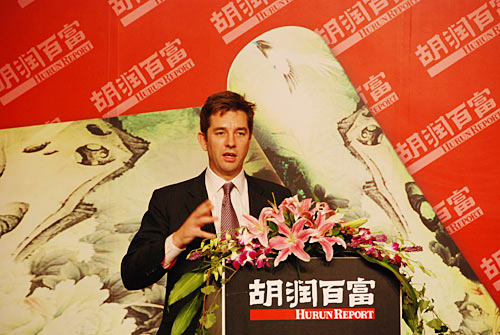|
 |
|
SPOTLIGHT: Rupert Hoogewerf, founder and compiler of the Hurun Rich List, addresses the fourth Hurun Rich List Summit held in Beijing on October 29, 2010, about the future of China's private sector (SHI BOSEN) |
For video please click here
In the natural course of business expansion, Chinese private businesses are looking overseas for new markets for their products and services, said Rupert Hoogewerf, founder and compiler of the Hurun Rich List, at the fourth Hurun Rich List Summit.
One of the best examples of a Chinese company going overseas, Hoogewerf said, was Li Shufu and his Geely Group when they bought the Volvo brand on August 2, 2010.
The expansions are driven by two motivators: many of China's private businesses are the bigger in the Chinese market and need new areas to develop; and some are already world leaders in particular sectors.
But branching out is not without its problems, as many private enterprises have run into obstacles in their internationalization efforts, especially when it comes to the investment environment in some countries, said Hoogewerf in an exclusive interview with Beijing Review.
The Hurun summit and 12th anniversary of the rich list was held in Beijing on October 29, 2010. The theme of this year's summit was "Outlook of the Chinese private economy in the next 20 years."
According to Hoogewerf, the biggest challenge for Chinese companies expanding abroad hasn't been breaking into a foreign market, but managing foreign staff. Chinese management styles don't translate well or provide a conducive work atmosphere for foreign workers. This will likely change in two decades' time as working with international staffs becomes integrated into Chinese management training methods.
The low-carbon economy, Hoogewerf said, is also a trend private enterprises will have to focus on. "Together with social responsibly, it is being addressed by every company," Hoogewerf said, adding that while these efforts may seem slow or non-existent, they are actually going along "much faster than people think."
Many private enterprises have already made their products much more environmentally friendly, a business move that will allow them to maintain their competitive edge and keep their eco-aware customer base.
"The government is the No. 1 stake holder in some of these companies, and many of them have worked very closely with the government on different projects. So these companies are and will be addressing the low-carbon issue much more now that it has become a government priority," said Hoogewerf. "Eventually, low-carbon initiatives will be more than something that's nice to have, it will be something you must have."
For the summit, the organization invited Chinese economic leaders who appeared on the rich list to offer their insight on China's development over the next two decades. The billionaires discussed the influence of domestic demand and the internationalization of China's private sector, as well as the growing low-carbon economy.
Zong Qinghou, Board Chairman and General Manager of the Hangzhou-based Wahaha Group and the richest man in China, and Chen Guangbiao, Chairman of Huangpu Investment Group, widely regarded as the most charitable man in China, highlighted the outlook of the next 20 years for China's private sector and the importance of the development of the low-carbon economy, respectively.
"The low-carbon economy needs publicity, and we need to make everyone realize the benefits of living a low-carbon life," Chen said. "We also need to take action now. Each person has the obligation to contribute to his or her own low-carbon career, and entrepreneurs must take steps to stop environmental pollution and ecological destruction in their pursuit of profits." | 